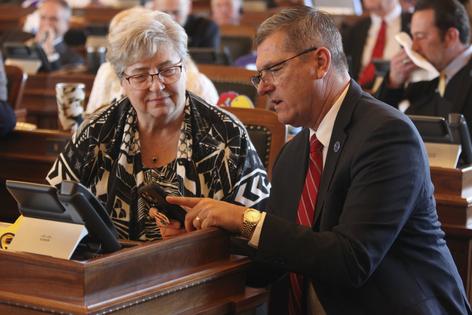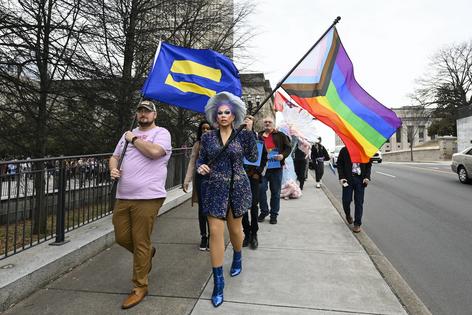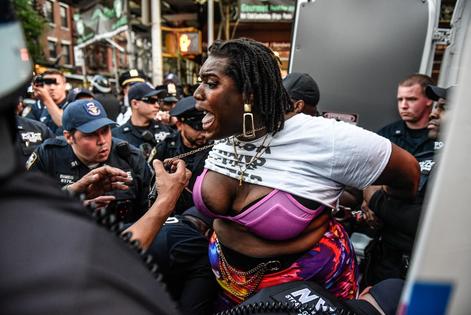Baseless anti-trans claims fuel adoption of harmful laws – two criminologists explain
Published in Political News
It has been seven years since North Carolina made headlines for enacting a “bathroom bill” – legislation intended to prevent transgender people from using restrooms that align with their gender identity.
After boycotts threatened to cost the state more than US$3.7 billion, legislators repealed the law in 2017. Since then, however, religious and political conservatives have successfully spread an anti-trans moral panic, or irrational fear, across the United States.
As far back as 2001, Republican lawmakers proposed the first of what are now nearly 900 anti-LGBTQ+ bills. More than 500 of these were introduced in 49 state legislatures and the U.S. Congress during the first five months of 2023. To date, at least 79 have passed.
Many of these anti-trans laws are written and financed by a group of far-right interest groups, including the Alliance Defending Freedom, the Family Research Council, the Liberty Counsel and the American Principles Project.
These groups claim their proposed laws would protect cisgender women and girls – those whose gender identity matches the sex they were assigned at birth – from the sorts of violent trans people that are often depicted in movies and other media.
But as criminologists, we know these claims are without merit. No reliable data supports the argument that transgender people commit violent crimes at higher rates than cisgender men and women. In fact, transgender people are more than four times as likely to be the victim of a crime as cisgender people.
Anti-trans laws like the one enacted in Kansas over the governor’s veto reach beyond restrooms to limit access to many sex-segregated spaces, including “locker rooms, prisons, domestic violence shelters and rape crisis centers,” based on the sex assigned at birth to a person who seeks to use those spaces.
As of the end of May 2023, at least 18 states had enacted laws within the preceding 12 months that limit medically age-appropriate gender-affirming health care for trans minors, with similar bills pending in 14 more states. And Florida’s barrage of anti-LGBTQ+ regulations even prohibits the mere discussion of sexuality and gender identity in schools through the 12th grade. Journalist Adam Rhodes called these efforts a “centrally coordinated attack on transgender existence.”
We believe these laws and bills illustrate the increasingly hostile legislative landscape for LGBTQ+ people despite polls showing that most people in the United States want trans people to be protected from discrimination in public spaces on the basis of their gender.
A variety of myths, false narratives, bad science, misconceptions and outright misrepresentations undergird anti-trans laws. The reality, however, is that trans-exclusionary laws do not protect cisgender women and girls from harassment or violence. Rather, they result in dramatic increases in violent victimization for transgender and gender-nonconforming adults and children.
When laws permit transgender people to access sex-segregated spaces in accordance with their gender identities, crime rates do not increase. There is no association between trans-inclusive policies and more crime. As one of us wrote in a recent paper, this is likely because, just like cisgender folks, “transgender people use locker rooms and restrooms to change clothes and go to the bathroom,” not for sexual gratification or predatory reasons.
Conversely, when trans people are forced by law to use sex-segregated spaces that align with the sex assigned to them at birth instead of their gender identity, two important facts should be noted.
First, no studies show that violent crime rates against cisgender women and girls in such spaces decrease. In other words, cisgender women and girls are no safer than they would be in the absence of anti-trans laws. Certainly, the possibility exists that a cisgender man might pose as a woman to go into certain spaces under false pretenses. But that same possibility remains regardless of whether transgender people are lawfully permitted in those spaces.
Second, trans people are significantly more likely to be victimized in sex-segregated spaces than are cisgender people. For instance, while incarcerated in facilities designated for men, trans women are nine to 13 times as likely to be sexually assaulted as the men with whom they are boarded.
In women’s prisons, correctional staff are responsible for 41% of women’s sexual victimization, with cisgender women committing the balance of nearly all prisoner-on-prisoner violence. Similarly, trans boys and girls who are barred from using the washrooms and locker rooms that align with their gender identity are respectively between 26% to 149% more likely to be sexually victimized in the locations they are forced to use than cisgender youths.
In society at large, between 84% and 90% of all crimes of sexual violence are perpetrated by someone the victim knows, not a stranger lurking in the shadows – or the showers or restroom stalls. But trans and nonbinary people feel very unsafe in bathrooms and locker rooms, though others experience relative safety there. In fact, the largest study of its kind found that upward of 75% of trans men and 64% of trans women reported that they routinely avoid public restrooms to minimize their chances of being harassed or assaulted.
Because criminological data does not support trans-exclusionary laws or policies, advocates of anti-trans laws often resort to lies, flawed anecdotal evidence, or what fact-checkers have called “extreme cherry-picking” to support their position.
For instance, one of us documented how isolated news stories, often from notoriously transphobic tabloids, conflate the actions of sexual predators with the “dangerousness” of trans women. Although there are undeniably examples of actual transgender people committing crimes, even deeply troubling ones, they are not evidence of any behavioral trends among the broader class of trans people. No such data exists.
We believe the spate of anti-trans proposals represents a textbook example of crime-control theater – an unnecessary, ineffective and harmful legislative response to unfounded fearmongering.
Anti-trans laws are not just baseless. They’re hurtful and damaging, especially to LGBTQ+ teenagers. Recent polls indicate that more than 60% of these people experience deteriorating mental health – including depression, anxiety and suicidal thoughts – as a result of laws and policies aimed at restricting their personhood.
The criminological research is clear that anti-trans laws do not help the people they are claimed to protect. In fact, these laws inflict harm on people who are even more vulnerable.
This article is republished from The Conversation, an independent nonprofit news site dedicated to sharing ideas from academic experts. If you found it interesting, you could subscribe to our weekly newsletter.
Read more:
Gender-affirming care has a long history in the US – and not just for transgender people
Social media gives support to LGBTQ youth when in-person communities are lacking
Henry F. Fradella has received funding from the National Science Foundation and the National Institute of Justice, but not with regard to anything relevant to the subject matter of this piece.
Alexis Rowland does not work for, consult, own shares in or receive funding from any company or organization that would benefit from this article, and has disclosed no relevant affiliations beyond their academic appointment.




























































Comments